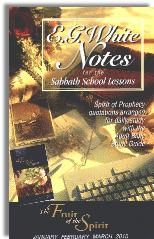|
||||||||||||||
Commentary on "The Fruit of the Spirit is Goodness"
Day 2: Sunday, February 7, 2010
Overview
In Sunday’s lesson, the author states that God is the most profound and absolute sense of the word “good”. Only His goodness is absolute. The lesson continues by stating that God has shown His goodness through creation, human relationships in the expression of love, and in the E.G. White Notes, through salvation.
Observations
While I found no real problems in what the lesson said, I found it to be overly simplistic. The author said that God’s goodness is seen all around us. He goes on to list the “positives” of this world as evidence of God’s goodness. The author does say, “Even in a fallen world, even with sickness, pestilence, and natural disasters, the goodness of God is still revealed in nature.” But just because His goodness is revealed in nature, does that indicate God is good? In other words, is evidence what defines the goodness of God?
It is important to understand that the goodness of God applies to all the other attributes of God. God’s judgment and wrath is good. God’s holiness is good. God’s righteousness is good. There is nothing about God that is not good.
Taken a step further, there is nothing God places before His children that is not good. God is wholly good, and He is at work in our lives for good. Nothing which God creates, nothing which God purposes, and nothing which God accomplishes, is not good.
The goodness of God is a foundational truth that should shape our entire perspective of His work in our lives.
Sometimes it is hard to know how to trust this foundational truth when we are in the midst of trials and tribulations. On the one hand, we know that God is good. Yet, on the other hand, we live within the circumstances of our lives that may challenge this idea. So the tendency is to blame Satan for the “bad”. While there is definite spiritual warfare in the world (Ephesians 6:12), we must understand that God is sovereign. Nothing is out of His control. Satan does not have full reign in this world, or in our lives. We have nothing to fear.
Paul was given a thorn in his flesh, which he described as a “messenger of Satan”. But God permitted Paul to live with this thorn so that God’s strength could be made perfect in Paul’s weakness (2 Corinthians 12:9). In another well known Bible story, Joseph’s brothers committed evil against him. But what they intended for evil, God intended for good (Genesis 50:20).
We can trust that whatever comes into the life of a believer is part of God’s purpose to bring about our good, and to reveal His glory.
Summary
- The goodness of God is not just evidenced by the good in the world but by the entire character of God.
- God’s goodness filters down into all of His other attributes: sovereignty, wisdom, holiness, faithfulness, and even wrath.
- We can trust that “...in all things God works for the good of those who love him, who have been called according to his purpose” (Romans 8:28).
GO TO DAY 3
Copyright 2010 BibleStudiesForAdventists.com. All rights reserved. Revised January 25, 2010. This website is published by Life Assurance Ministries, Glendale, Arizona, USA, the publisher of Proclamation! Magazine. Contact email: BibleStudiesForAdventists@gmail.com.
The Sabbath School Bible Study Guide and the corresponding E.G. White Notes are published by Pacific Press Publishing Association, which is owned and operated by the Seventh-day Adventist church. The current quarter's editions are pictured above.
Official Adventist Resources
Standard Edition Study Guide Week 7
Teacher's Edition Study Guide Week 7
Easy Reading Edition Study Guide Week 7
Search the Complete Published Ellen G. White Writings


